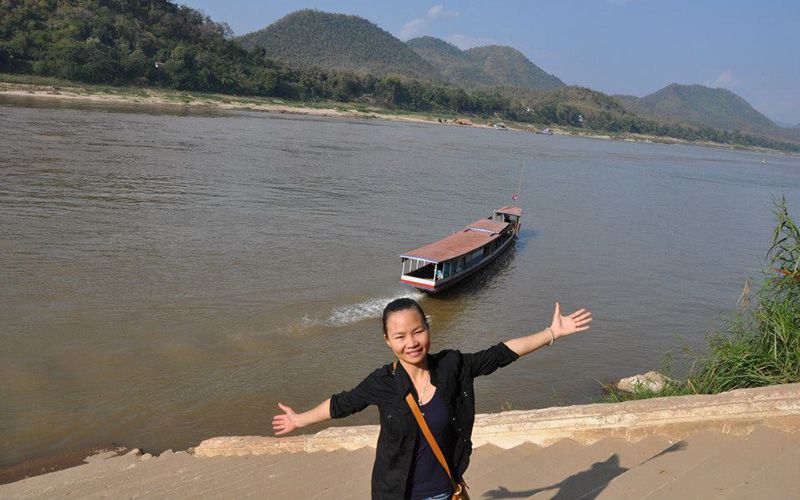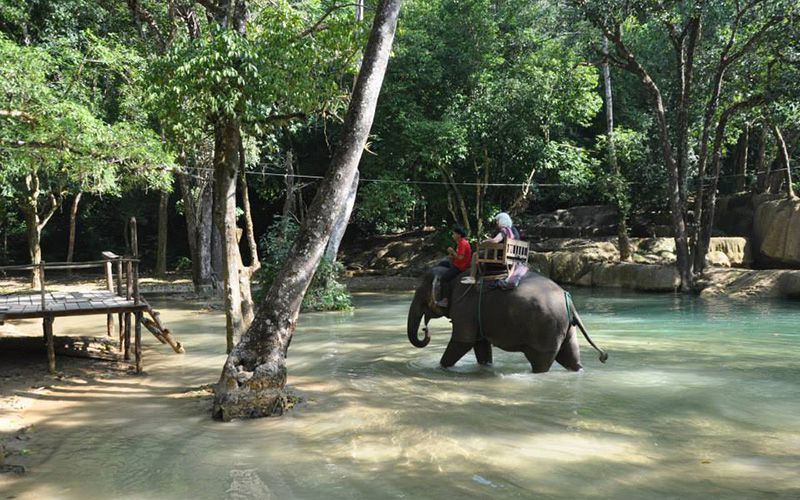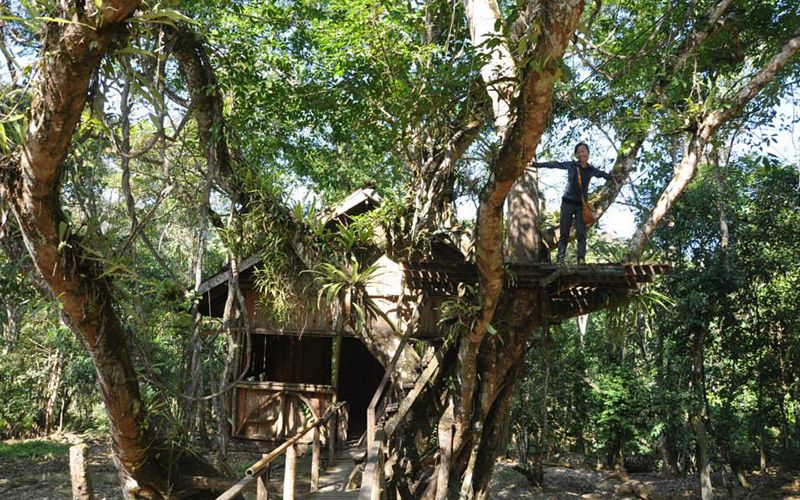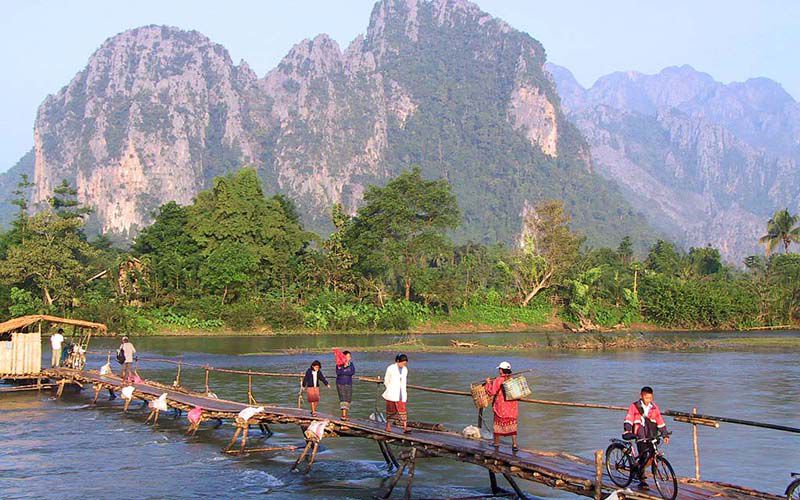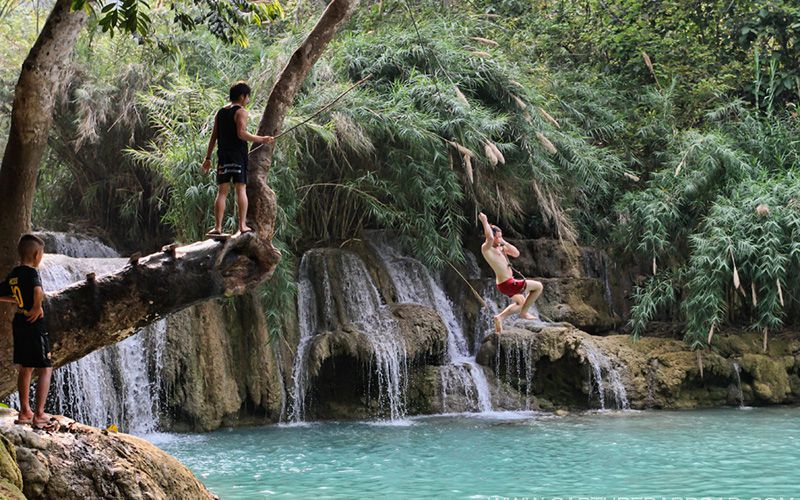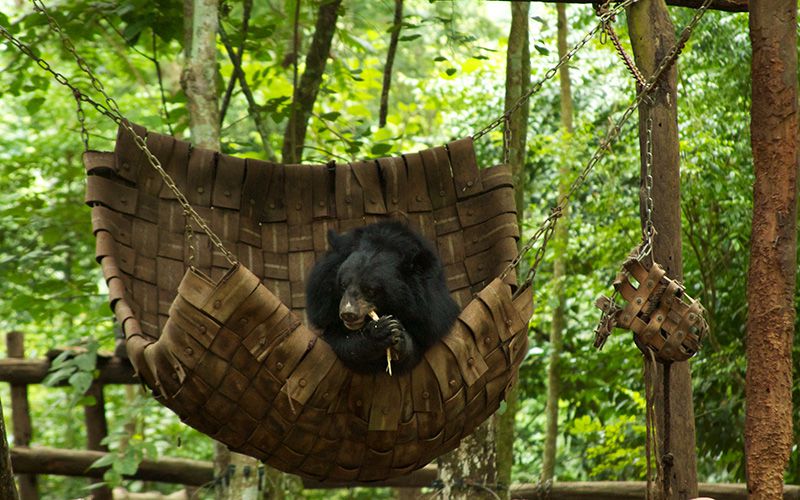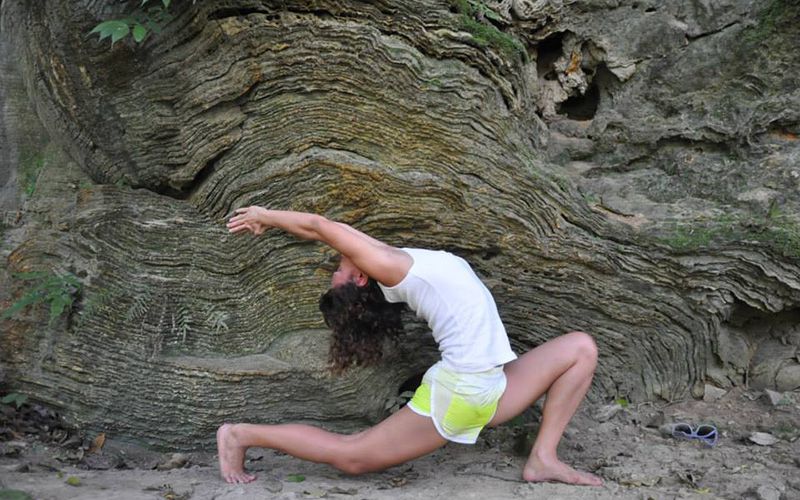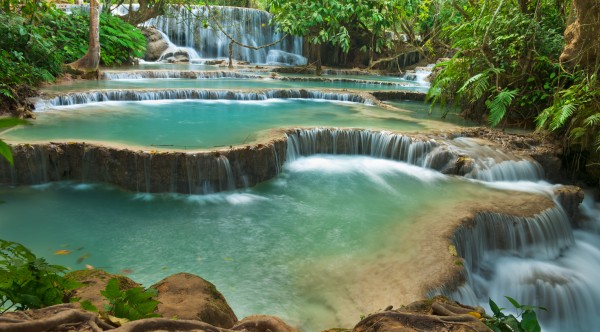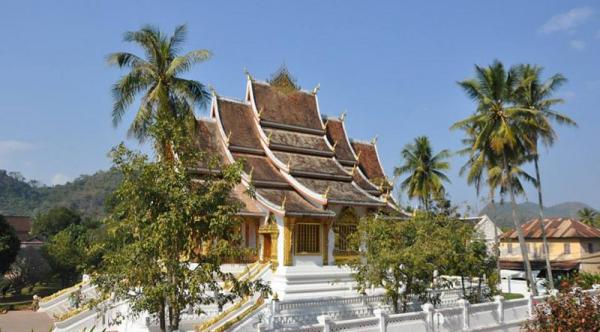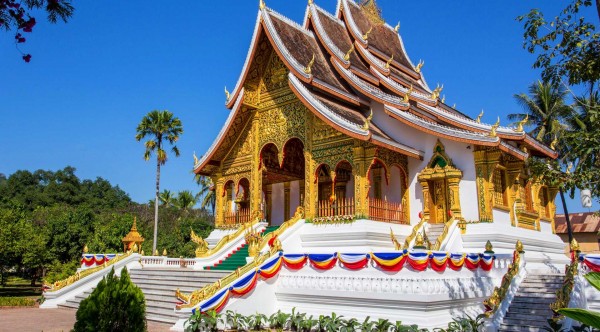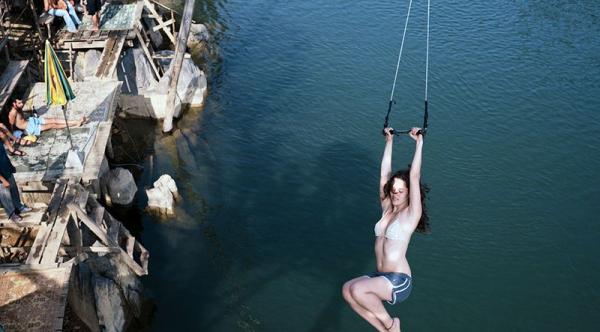Itinerary
The trip starts in Luang Prabang, the spiritual capital of Laos. Dozens of temples fill the town and orange-robed monks wander about the tree-lined streets. Colonial buildings, colourful markets, great caves and cascading waterfalls are all waiting to be explored in Luang Prabang.Travel along mountain roads to the small town of Vang Vieng, situated on the banks of the Nam Song River and surrounded by limestone formations. We stop at Xieng Khoang to discover Plain of Jar, the most famous destination there. Continue to Vientiane, whose laid-back pace is unlike any other capital city in the region.
The final stretch of the journey takes you to Done Khong Island, which is a great destination for relaxing. The temple of Wat Phu is sure to leave a lasting impression, a 9th century building nestled amongst the hills of this tranquil area.From north to south, every day you will discover a different side of this magical country.
Day 1: Arrival Luang Prabang
On arrival at the airport, you will be met and transferred to your hotel. Luang Prabang was the royal capital of the former Lane Xang Kingdom, with its gleaming temple roofs, colonial architecture and stunning mountain backdrop retains a unique charm rarely found in all Asia. Here is plenty to see, including the impressive stupa of Wat Visoun, the shrine of Wat Aham and Wat Mai with five tiered roofs. We include these sights in a half day guided tour, which ends with a climb to Phousi Hill to enjoy a beautiful sunset view of the city and its glowing reflection on the Mekong River. There are 329 steps leading us on zigzag way past various temples to the sacred, gilded stupa of Wat Phousi at the summit. Overnight in Luang Prabang
Day 2: Luang Prabang – Pak Ou Cave (B, L)
Today we continue our tour of Luang Prabang with the temple of Wat Xieng Thong, a magnificent piece of architecture, which nestles at the meeting of the Mekong and the Nam Khan River. The temple structures are decorated in various ways with gilded stuccoes as well as doorways and the main sim has a marvelous ‘tree life’ mosaic pattern on an outer wall. We embark on a boat for a leisurely trip on the Mekong River, stopping en route at Ban Xang Hai to see the production of and to sample the local rice wine. Upon leaving this village we pass through stunning mountain landscape to the mysterious Pak Ou Caves. These two linked caves are crammed with thousands of gold lacquered Buddha statues of various shapes and sizes, all brought there by devout villagers. After the river trip we drive towards Ban Phanom, a small village known for its hand weaving. Overnight in Luang Prabang
Day 3: Luang Prabang – Khouangsi Waterfall (B, L)
The exploration of Luang Prabang would be not complete without a visit to the National Museum (closed Tuesdays) at the former Royal Palace. This interesting structure displays a lovely collection of treasures and artefacts reflecting the richness of Lao culture dating from the days of the early kings right through the last sovereign. Heading out of town we drive southbound passing some verdant and rugged scenery on our way to visiting some hill tribe people at Ban Lao Soung and Ban Ou. Here we take a walk to the beautiful Khouang Si waterfalls, where water tumbles over multi tiered limestone formations into cool and crystal clear pools, ideal for anyone seeking an enjoyable escape when the heat becomes unbearable. Overnight in Luang Prabang
Day 4: Luang Prabang – Xieng Khouang (B)
Today we leave this charming town and drive to Xieng Khouang, an area famous for the mysterious Plain of Jars.These back roads are a great way to explore the real Laos. We see very few other travellers, mostly rural dwellers who are just as interested in finding out about our lives as we are of theirs. The drive is very long, but we can make many stops at our pleasure, to stretch our legs and take some wonderful photographs. In the afternoon there will be time to see the old capital of Muang Khoun Province and its’ nearby villages. Overnight in Phonsavanh
Day 5: Xieng Khouang – Vang Vieng (B, L)
The “Plan of Jars” is an impressive archaeological site where hundreds of large stone jars are scattered all over a plateau. These huge jars are supposedly over 2,000 years old, but most of archaeologists still question their purpose. We have time today to explore the site and some nearby villages, populated by the Hmong hill tribe and Tai Dam people; they are very poor but possess a vibrant local culture and an interesting history. We leave Xieng Khouang for our scenic drive to Vang Vieng, a small town, which is nestled on a bend of the Nam Song River. Its stunning scenery with its limestone outcrops remains unspoiled, despite recent developments with the advent of tourism. Depending on road and traffic conditions, we will arrive at Vang Vieng by mid or late afternoon. Overnight in Vang Vieng
Day 6: Vang Vieng – Vientiane (B)
An impressive way to start our day is a walk around the bustling central market. Heading out of town we enjoy a short bamboo raft along the NamSong River, which gives us a taste of adventure. The limestone cliffs and valleys surrounding the resort complex of Vang Vieng are home to numerous caves and caverns. The most famous in Vang Vieng is the cave of Tham Jang, which was used in the early 19th century in defense against the Chinese invaders. We also cross the river to Ban Huai Ngai, a very pleasant village where we can explore the different local lifestyles. We bid farewell to Vang Vieng and drive to Vientiane. Located on the banks of the Mekong River, this capital conjures up exotic images, with a curious mix of Lao, Thai, Chinese, Vietnamese, French influences. Overnight in Vientiane
Day 7: Vientiane City Tour (B, L)
Our full day sightseeign tour of Vientiane commences with a visit to Wat Sisaket, the oldest temple standing in Vientiane. This amazing structure features remarkable frescoes and Buddha statues. The following sight is the former royal temple of Haw Pha Kaew, which previously housed the famous Emerald Buddha Image. We also visit the imposing Patouxai Monument well known as Vientiane’s own Arc de Triomphe before continuing to the great sacred structure and symbol of Laos, That Luang Stupa. We also head out of town to see the Buddha Park, a scattered enchanting collection of Buddhist and Hindu sculptures on the Mekong Riverside meadow, near the Friendship Bridge. There are approximately 200 religious images dating back over 500 years, which were created by a mysterious monk spreading his philosophy on life and revealing his ideas about the universe. Admiring the spectacular view over the Mekong River at sunset from one of the riverside bars is a perfect way to finish the day. Overnight in Vientiane
Day 8: Vientiane – Thakhek – Ban Na Hin (B, L)
We depart early for our drive towards Khammouane province. Along the way we can make several stops to stretch your legs and take some wonderful pictures of the breathtaking scenery of Lao Countryside. Depending on road and traffic conditions, we will arrive at Ban Na Hin, the gateway to Khong Lor Cave, by mid or late afternoon. On arrival we enjoy a short walk around this charming village, enabling us to understand a little more about their culture and lifestyle. Overnight in Ban Na Hin
Day 9: Ban Na Hin – Khong Lor – Ban Na Hin (B, L)
Today we take the short drive to the amazing cave of Khong Lor is 7.5km long and was formed by the Hinboun River, which flows though the cave all year round. The cave boasts many impressive stalactite formations. We also stop en route for a walk to That Mouang and That Namsanam Waterfalls. Overnight in Ban Na Hin
Day 10: Ban Na Hin – Savanakhet – Pakse (B)
We leave Ban Na Hin and continue venturing in southern Laos, towards Pakse, the capital city of the south. Along the way we make stop at Sananakhet. This fast growing town has become an important trade center between Vietnam and Laos. There is not much to see in this town but it is a necessary stop for lunch. We arrive in Pakse Town by mid afternoon and have time to stroll around and catch our first glimpse of the town. Overnight in Pakse
Day 11: Pakse –Tadlo (B, L)
The next destination of our trip will be Tadlo. On our way we pass many lush plantations, hills, forests and villages. Part of our pleasure of travelling in this region is to observe the beautiful countryside and meet local people. We stop over at some of the nearby villages, home of the Kato hilltribe group. The hill tribe people are unfailingly friendly; welcoming you with waving hands and smilling faces. These ethnic minorities still retain their age and old cultural traditions and are recognisably distinct from each other by their dress. We continue our journey through the Paksong and Boloven Plateau. The Boloven Plateau is known for its cooler temperature being located high above the Mekong Valley. Rivers run off this high plateau in all directions and then plunge out to lush forests along in a series of spectacular surging waterfalls. The scenery around Tad Fan waterfall is spectacular with twin waterfalls plummeting into a deep gorge surrounded by flourishing vegetation. A trip to the plateau provides a refreshing break from the heat and allows you to see the cultivation of rich coffee, tea, cardamom, bananas, and other crops that are grown in the area. This trip gives visitors the chance to venture off the beaten track and to discover some of the lesser-known areas of Laos, exploring the wild beauty of this southern region. Overnight in Tadlo
Day 12: Tadlo – Wat Phou – Donkhone (B, L)
The views of tumbling water and lush vegetation around the waterfalls are nothing short of spectacular. We leave this lovely destination and drive back to Pakse and enjoy a leisurely trip to the former royal capital of Champasak, our base for exploring the ruins of Wat Phu. One of Southeast Asia’s most dramatically situated temples. We have time to explore these intriguing Khmer ruins, which are perched at the base of Mount Phu Kao. Wat Phu is one of the Lao World Heritage sites recognized by UNESCO in 2001, this wonderful archeological site of Khmer civilization dates back to the 9thcentury, predating the famous Angkor Wat in Cambodia. A festival of this site is held yearly during the full moon in February and attracts numerous pilgrims from all over southern Laos. We continue our journey by motorboat to Don Khone, in the South Mekong river region known as the 4000 islands, one of the most scenic areas in Laos. Overnight in Don Khone Island
Day 13: Donkhone – Khong Island – Surrounding (B, L)
Heading out of town we embark on a long tail boat for venturing into the widest reach of the Mekong River, where during the dry season the waters recede and leave behind thousands of islets, giving this area a lovely name” Si Phan Done”. We explore the local peaceful villages of Ban Khone, where you will see an array of relics from the French colonial era and retrace the old colonial past, including old French colonial buildings and the remnants of the first Lao railway with it’s locomotive. We continue to discover the 4000 islands area by boat and visit the marvelous Liphi waterfall, also called the “Corridor of the Devil” one of the most beautiful waterfalls marking Lao border with Cambodia. If we are lucky, we may even see the rare freshwater Irrawaddy Mekong dolphin at Ban Hang Khone. Overnight in Done Khone Island
Day 14: Done Khone Island – Cambodia Border (B)
After breakfast, we board a boat to Ban Nakasung and take a short drive to the Lao – Cambodia border, en route we visit the breathtaking Khone Phapheng waterfall, the South East Asia’s biggest waterfall, known as the Niagara of the East. The trip ends after transfer to the Lao-Cambodia border at Veukham or Dong Kalor border gate. End of services!

